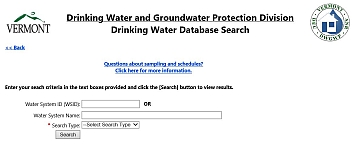New and existing Public TNC water system are required to obtain permits for source(s), construction, and operation from the Drinking Water and Groundwater Protection Division. Applicants of all permits must comply with the Chapter 21 of the Water Supply Rule.
Wastewater System and Potable Water Supply Permit
Source Permit
Construction Permit
Operating Permit
Wastewater System and Potable Water Supply Permit
The Regional Office Program of the DWGWPD issues Wastewater System and Potable Water Supply (WW) Permits for soil based wastewater systems with flows less than 6,500 gallons per day, for potable water supplies (water supplies that are not Public), and for municipal water and sewer connections. Construction of a new or modification to an existing TNC water system may require a new or amended WW Permit.
Contact the Engineer located in the Regional Office serving your area to determine if a new or amended WW Permit is required for your project.
Use the Permit Navigator tool to identify any other State environmental permits or approvals that are required for your project on a single parcel. If you have a linear, polygon, or multi-parcel project, contact a Community Assistance Specialist to get started.
Source Permit
All Public Water Supply Systems are required to obtain a Source Permit for construction of a new source, hydrofracturing or deepening of an existing source, and an increase in withdrawal from an existing source. Source Water Permitting is a multi-step process managed by the Water Resources Section.
Key Highlighted Steps:
-
Submit a TNC Source Permit Application with correct application fee for administrative and technical review;
-
Commence construction or modification of the source(s) with approval from the Division Hydrogeologist;
-
Submit a Source Testing Review Application to initiate the review and approval process for water quality sampling and yield testing to be conducted on the new or modified source(s);
-
Complete requirements specified in the Source Testing Approval letter and then submit a Source Evaluation Report for technical review;
-
Receive the Source Permit.
Construction Permit
A Construction Permit is required for construction of a new Public water system; connection to a new permitted source; and modification, improvement, and repair of existing Public water systems. Construction Permits are managed by the Division's Engineering Section.
Key Highlighted Steps:
-
Submit a Construction Permit Application with the correct application fee for review by the Engineer;
-
Make corrections and provide additional information as required by the Engineer;
-
Receive the Construction Permit;
-
Complete the project;
-
Submit As-Built Record Drawings and other required documentation to verify completion of the project in compliance with the Construction Permit.
Operating Permit
All Public water systems are required to have an Operating Permit. TNC water systems qualify for either the General Operating Permit or an Individual Permit to Operate.
All permittees, regardless of the permit type, are subject to a $100 annual permit fee that is invoiced in June of each year. The annual permit fee was increased by the legislature from $50 to $100 effective July 1, 2015 pursuant to House Bill H.489. The final statutory language is found in V.S.A. Title 3, Chapter 51, Subchapter 2, §2822 (j)(7)(D)(i) at http://legislature.vermont.gov/statutes/section/03/051/02822.
The annual operating permit fee is one of many funding sources that supports the operation of the TNC Program. What does the TNC Program do for you? The TNC Program provides operational, managerial, and technical support and outreach to the owners and operators of public TNC water systems. Our goal is to protect the health of everyone who consumes water at public water systems. We do this by conducting sanitary surveys, ensuring that systems are performing routine water quality monitoring, training water system operators, verifying compliance with state and federal regulations, and providing trainings throughout the state. The TNC Program understands owning and maintaining a public water system can be challenging. This annual fee ensures that the TNC Program can continue to provide critical assistance and outreach to the state’s TNC water systems in order to protect public health.
2020 General Operating Permit
Coverage under a General Operating Permit is available for new and existing TNC water systems that meet the qualifications for coverage listed below. The General Operating Permit for Class 1A and 1B Public TNC Drinking Water Systems that was issued on March 1, 2010 expires on February 28, 2020. The DWGWPD has issued a new 2020 General Operating Permit for Class 1A and 1B Transient Non-Community Drinking Water Systems that is effective on February 29, 2020. The 2020 General Operating Permit does not expire, but it can be modified and reissued pursuant to Condition T of the permit. All eligible Class 1A and 1B public TNC drinking water systems shall apply for authorization to operate subject to the new 2020 General Operating Permit by completing the Notice of Intent (NOI) to Operate Subject to the 2020 General Permit for Class 1A and 1B Public TNC Drinking Water Systems. The DWGWPD will review the NOI and existing records to determine if the water system meets the qualifications for coverage listed below. If the water system meets the qualifications, the DWGWPD will grant the Permittee written authorization to operate the water system under the 2020 General Operating Permit. If the Water System does not meet the qualifications of the 2020 General Operating Permit, the DWGWPD may require the submission of additional information or documentation to assess the water system’s qualifications or the Permittee will be required to submit a complete Application for a Public Water System Permit to Operate to the DWGWPD.
Qualifications for Coverage
- The water system is classified as Class 1A or 1B as defined in Section 12.8 of the Vermont Water Supply Rule;
- The Secretary has determined that the sources are not surface water or groundwater under the direct influence of surface water; and
- The Secretary has determined that operation of the water system will comply with 10 V.S.A. § 1675 and the Vermont Water Supply Rule and will not constitute a public health hazard or significant public health risk.
Does your Class 1A or 1B water system qualify for the 2020 General Operating Permit? Check here!
Individual Operating Permit
A water system must submit a complete Application for a Public Water System Permit to Operate if it does not meet the General Permit eligibility criteria. The DWGWPD will evaluate the application for completion and a Permit to Operate will be issued to the water system. The Permit to Operate may include a Compliance Schedule and/or Special Conditions for required system improvments. Individual Permits to Operate do not have an expiration date but may be amended by the DWGWPD as deemed necessary over time. There is no application fee but the water system is subject to the $100 annual permit fee.


